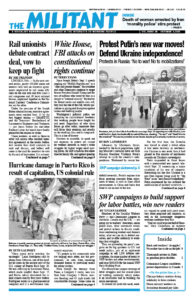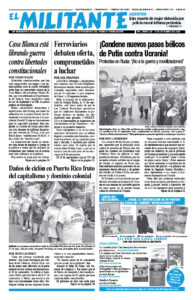As Washington announced its emergence as an imperialist power by seizing a series of Spanish colonies in the 1898 Spanish-American War, the U.S. Supreme Court over the next few years sharply limited constitutional rights and protections for residents of the U.S. rulers’ new possessions. They included Puerto Rico, Philippines, Guam, American Samoa and, two decades later, the U.S. Virgin Islands.
These rulings — known as the Insular Cases — are still on the books today. They described those inhabiting these U.S. colonial possessions as “savage tribes” and “an uncivilized race.”
One of the first of these cases was Downes v. Bidwell in 1901, aimed at letting the capitalist rulers establish iron control over the riches and people of these territories. The case involved a tax issue, but the ruling was much broader.
Justice Henry Billings Brown, writing for the majority, ruled that the Constitution could be applied in U.S. conquest of “contiguous territor[ies] inhabited only by people of the same race or by scattered bodies of native Indians.” But not in colonies the U.S. rulers seized that were “inhabited by alien races, differing from us in religion, customs, laws, methods of taxation and modes of thought.”
Five years earlier Brown had issued the court’s ruling in Plessy v. Ferguson, the infamous decision holding that Black people could be relegated to “separate but equal” treatment, a decision that legalized Jim Crow segregation and remained in place for almost 60 years. It is no accident that the U.S. rulers wanted sanction for the oppression of Blacks at home and subjugated colonial peoples abroad at the same time.
The Insular Cases also drew a distinction between “incorporated” territories like Hawaii, Oklahoma and New Mexico, and “unincorporated” possessions, like Puerto Rico, that were to be kept in colonial bondage. The high court ruled that only “fundamental rights” apply in these territories, but didn’t say what those were. It did say those rights didn’t include the right to vote, and a further decision in 1922 said the right to trial by jury in Puerto Rico was not “fundamental” enough.
There is growing political pressure in Puerto Rico and beyond today to get rid of naked justification for colonial rule. In a case decided by the Supreme Court April 22, Supplemental Security Income was denied to José Luis Vaello Madero, a resident of Puerto Rico, even though he had been eligible for it earlier as a resident of New York. Both the Trump and Biden administrations had defended the government against a lawsuit by Vaello Madero. Justice Neil Gorsuch wrote a commentary to the decision sharply opposing the continued existence of the Insular Cases.
“A century ago in the Insular Cases, this Court held that the federal government could rule Puerto Rico and other territories largely without regard to the Constitution,” he wrote. “It is past time to acknowledge the gravity of this error and admit what we know to be true: The Insular Cases have no foundation in the Constitution and rest instead on racial stereotypes. They deserve no place in our law.”
“The flaws in the Insular Cases are as fundamental as they are shameful,” he continued. “Nothing in the Constitution speaks of ‘incorporated’ and ‘unincorporated’ Territories. Nothing in it extends to the latter only certain supposedly ‘fundamental’ constitutional guarantees. Nothing in it authorizes judges to engage in the sordid business of segregating Territories and the people who live in them on the basis of race, ethnicity, or religion.”
It is in the interests of all working people to back Gorsuch’s call for overturning the Insular Cases. Better still, to join in support of the fight of Puerto Ricans for independence from U.S. colonial rule.

